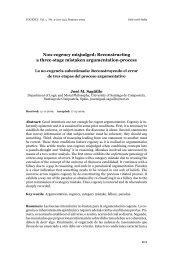Cogency v2 n2
Cogency v2 n2
Cogency v2 n2
You also want an ePaper? Increase the reach of your titles
YUMPU automatically turns print PDFs into web optimized ePapers that Google loves.
COGENCY Vol. 2, N0. 2, Spring 2010<br />
for rational shared deliberation between contending parties to resolve these<br />
issues, both theoretical and practical.<br />
After this, MacIntyre outlines some practical precepts of natural law (concerning<br />
the wrongness of murder, theft, inter alia.) and explains the obstacles<br />
to practical rationality as well as the theory of human nature presupposed<br />
by natural law. Since the obstacles are mostly due to the latter I will<br />
start with it. MacIntyre follows Catholic tradition in describing human nature<br />
as being both good (created in the imago dei) and bad (the divine image<br />
is corrupted by original sin). Because of the former we are able to know<br />
good and evil, but because of the latter we are either unable or unwilling to<br />
recognize and/or follow natural law. There are three major obstacles to correct<br />
reasoning in moral matters: psychological, ideological and logical. The<br />
first is due to defects in human nature primarily our egoism and egotism.<br />
The former is our propensity (emphasized repeatedly by MacIntyre) to prefer<br />
the pursuit of power, pleasure and money to the precepts of natural law.<br />
The latter is due to our pride or arrogance. We think that we are right and<br />
are unwilling to engage in a genuine dialogue based on shared deliberation<br />
in which we do not begin with the assumption that our group’s beliefs or<br />
ideology is the one true correct view.<br />
MacIntyre is critical of the major ideologies of modernity: liberalism, conservatism,<br />
socialism, communism, libertarianism and communitarianism.<br />
While there are significant differences between them, all are guilty of<br />
uncritically sharing the agenda of modernity and the post-enlightenment world.<br />
The purely logical problems he says surprisingly little about, especially the<br />
two major ones: the is-ought distinction and the infinite regress problem 2 .<br />
MacIntyre then goes on to provide a critique of two of the dominant<br />
secular moral theories of modernity: utilitarianism and Kant’s Categorical<br />
Imperatives. His major criticism of utility concerns its defective theory of<br />
happiness, as compared to Aristotle’s eudaimonia (usually translated as<br />
“happiness”). He does recognize that there is a version of utilitarianism called<br />
negative utilitarianism. 3 Kant’s Categorical Imperative is criticized on<br />
2<br />
Since MacIntyre wrote about the is/ought and fact/value distinction in AV, and since<br />
his views on first principles are the Aristotelian solution to the infinite regress problem I do<br />
not comment on this apparent neglect of a key issue in moral philosophy.<br />
3<br />
Negative Utilitarianism argues for an asymmetry between the moral connotations of<br />
pleasure and/or happiness and pain. Only the latter, on this view, has any moral claims on<br />
138








